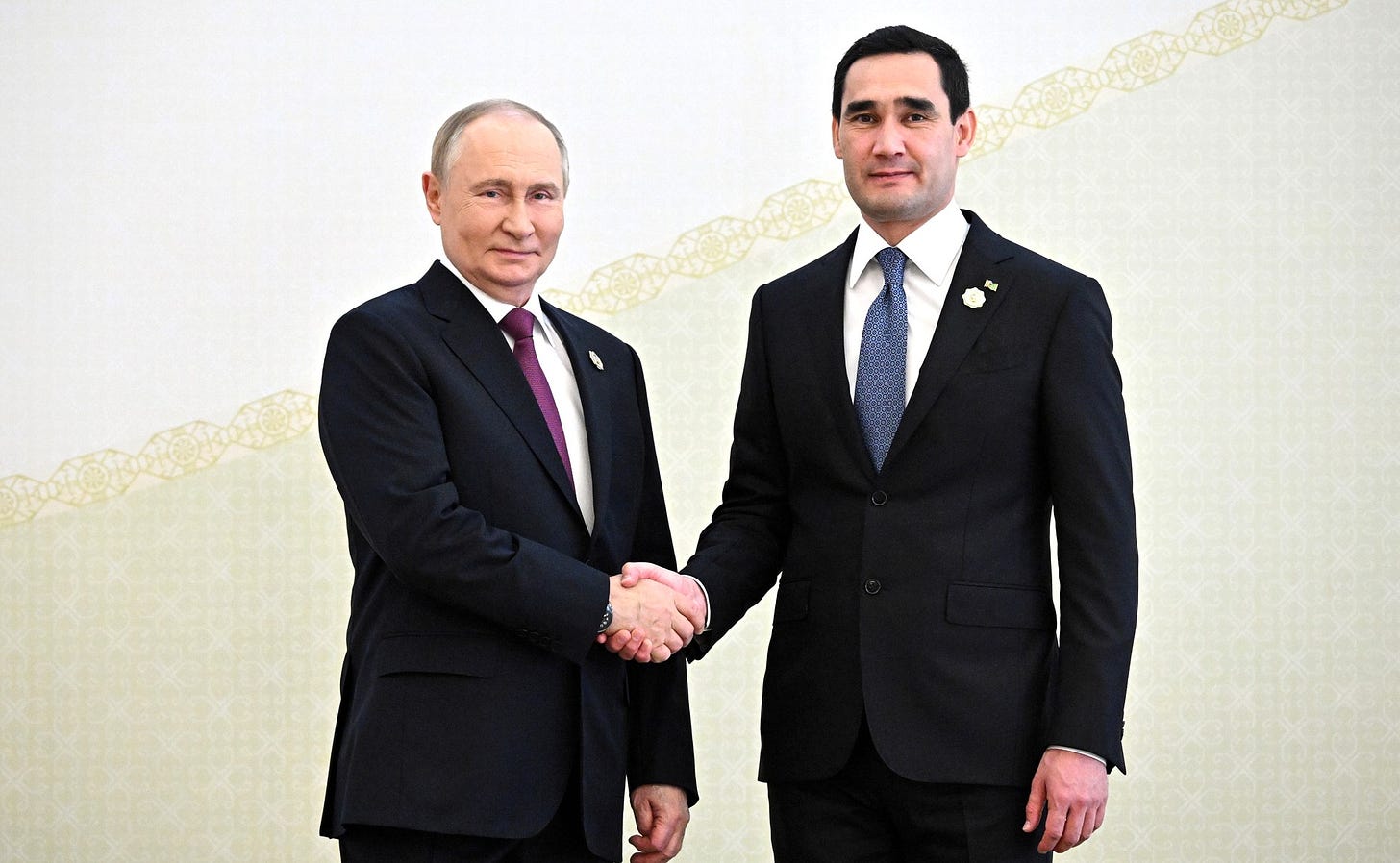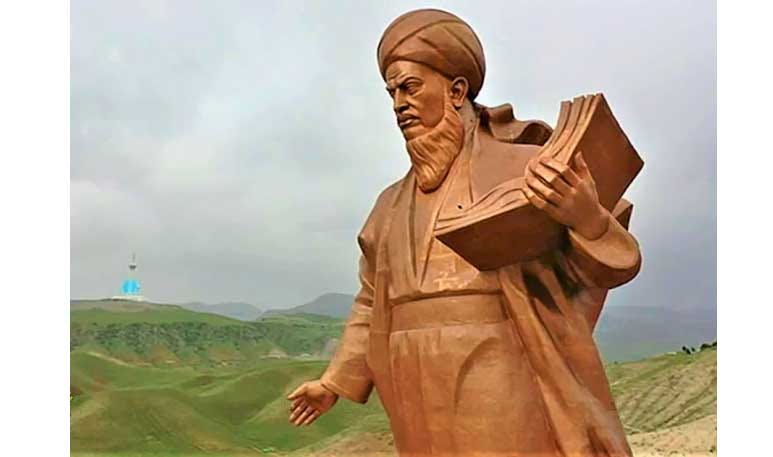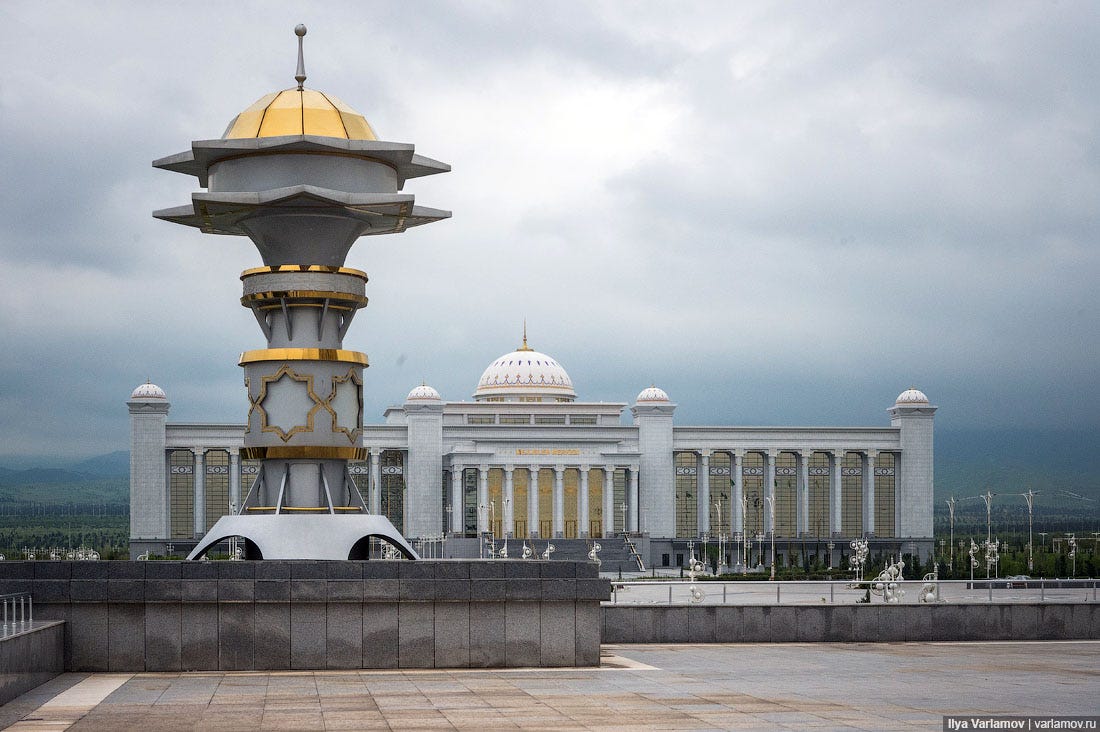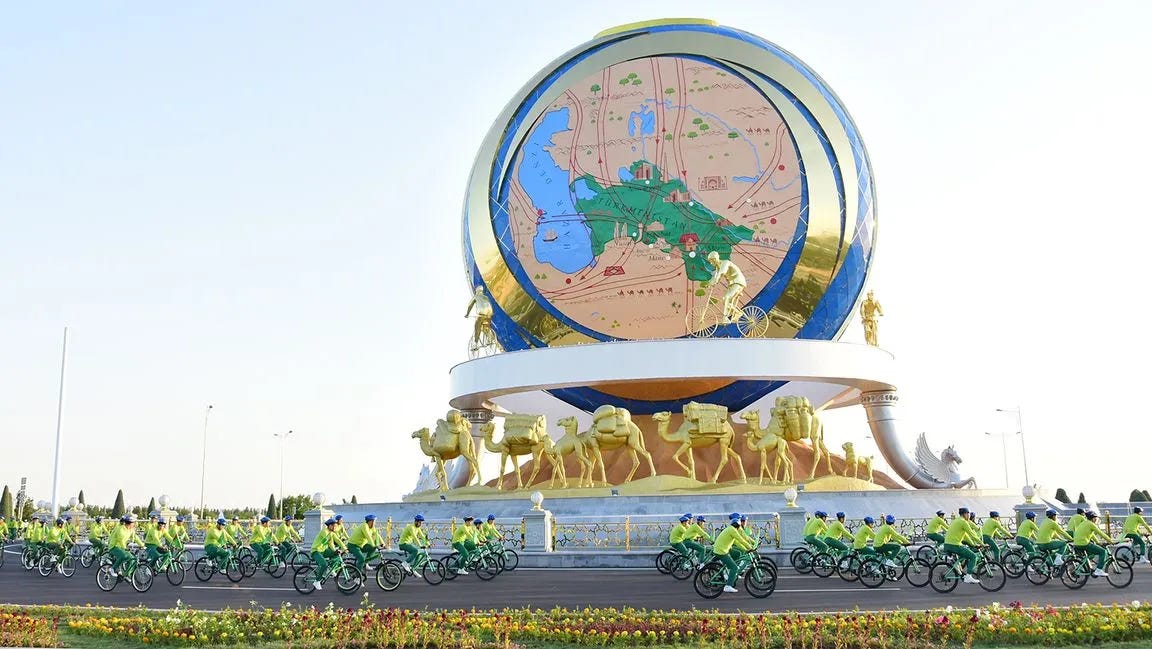BRICS Tune-up in Turkmenistan
Putin at the Plenary session of the International Forum "Interrelation of Times and Civilizations-the Foundation of Peace and Development"
Vladimir Putin and President of Turkmenistan Serdar Berdimuhamedov. Turkmen and related names look impossible but are rather simple when you parse the syllables then join them together slowly to get the tempo then rapidly.
While Lavrov attended to ASEAN matters, Putin took a short jaunt to Ashgabat, Turkmenistan’s capital, where the Kremlin said:
The President of Russia will take part in the International Forum "The Connection of Times and Civilisations – the Basis of Peace and Development" dedicated to the 300th anniversary of the birth of the outstanding Turkmen poet and thinker Makhtumkuli Fragi.
Yet another famous person from the Global South unheard of elsewhere but of monumental importance in his native land as you see below—and those aren’t the only monuments to his memory.
I insist readers take a few minutes to watch the 8-minute video of Putin’s speech to see the vastness of the venue and diversity of those assembled as the photos don’t capture those elements. And given the conference’s theme, a great diversity is what’s required. However, just devoting one day doesn’t seem enough given the theme. I see this as preparation for the BRICS Summit October 22-24 as the theme there will be similar given Russia’s theme for the year, “Strengthening Multilateralism for Just Global Development and Security.” Intercultural and intercivilizational communication and relations are the hallmarks of the Multipolar World which finds many nations allied in many causes, many of which intertwine. It’s clear from its many attempts that the Outlaw US Empire wants to disrupt and impede this new gathering together of nations to pursue their joint and individual interests and in the process rebuild the United Nations on a new foundation based on old but seminal principles. The Turkman poet/scholar Magtymguly Fragi was also a cosmopolitan man and an excellent symbol for the Forum and Humanity’s future. When literary canons are devised nowadays, they must be global as those writers and scholars considerably outnumber those of the West. As more people gain quality educations, a greater diversity of ides and possibilities emerge that are much richer than before. But acceptance and tolerance of the New coming from outside the old Norm remains hard to attain. And we’re not dealing with exotic counter-culture here. What seems new really isn’t as it’s been present for centuries. Now let’s look at Putin’s speech to see how he incorporated the theme:
Vladimir Putin: Dear Serdar Gurbangulyevich,
Dear Ladies and Gentlemen, Friends!
The international Forum "Interrelation of times and Civilizations – the foundations of peace and development", dedicated to the 300th anniversary of the birth of the thinker and philosopher, poet and public figure Makhtymguly Fragi, is very relevant today in the modern world.
Magtymguly Fragi is deservedly considered a great humanist, the founder of Turkmen poetry and literature, and Magtymguly's works, his rich creative heritage, are rightfully included in the golden fund of world culture.
Makhtumkuli was one of the first people to discover the beauty of the Turkmen language in all its fullness and diversity. He had a unique poetic style – to express thoughts briefly, but at the same time succinctly and aphoristically. Many of his sayings, as they say, went to the people, became catch phrases, proverbs, sayings. Makhtumkuli's books were not only read, but kept at home as sacred relics.
What I would like to draw your attention to – special attention: during the Second World War, as they used to say in the Soviet Union and as they called this war, during the Great Patriotic War, in letters to Turkmen soldiers to the front, their relatives quoted the poet's poems, tried to encourage the soldiers, instill in them courage and bravery. I will quote one of these phrases: "All our tribes are marching under the shadow of the righteous banners from all sides."
Makhtumkuli's works were translated into Russian. It is well known that the poet himself lived for quite a long time near Astrakhan in the village of Funtovo, where the Turkmen diaspora has been living compactly since the end of the XVII century. In 2019, a school named after Makhtumkuli appeared there, built on the initiative of Gurbanguly Myalikgulyevich Berdimuhamedov. In Astrakhan itself, a monument to Makhtumkuli was erected, and in September a bust of this outstanding poet was unveiled in a solemn atmosphere in Moscow.
Far ahead of his era, Makhtymguly never stopped in his creative and spiritual search and always strove for knowledge and truth. By the power of his genius, he managed to anticipate the future of his region and people. Through his work, Makhtymguly always called for purity, justice and equality not only in relations between people, but also between entire states and nations. He advocated the affirmation of high ideals of friendship and good neighborliness and perspicaciously tried to convey these thoughts to subsequent generations, calling for harmony and responsibility, tolerance and understanding, respect and solidarity.
All this is still close and clear to sane people today. It is especially relevant and in demand in the current difficult situation, when the world is facing unprecedented threats generated by civilizational rifts, interethnic and interfaith conflicts, when international relations have entered an era of global fundamental changes, when a new world order is being formed that reflects the diversity of the entire planet, and this natural process is irreversible.
New powerful centers of economic growth, financial and political influence are emerging, primarily here, in the Global East and in the Global South as a whole. These new centers strive to preserve and strengthen sovereignty and socio-cultural identity and seek ways of harmonious development in accordance with their traditions and based on national interests.
The world majority states, of which Russia and all the countries represented at the forum are a part, stand in the spirit of Makhtymguly's philosophical approaches for a more equitable distribution of benefits, for the consistent democratization of international life. We are convinced that universal peace and comprehensive development can be achieved only on the basis of taking into account the views of each nation, while respecting the right of each State to its own sovereign course, to its own worldview, to its own traditions and religious beliefs.
I would like to emphasize that Russia supports the broadest possible international discussion on the parameters of interaction in the emerging multipolar world, and is open to discussing issues of building a new world order with all our friends, partners and like-minded people, including within the CIS, Eurasec, the Shanghai Cooperation Organization and BRICS.
It is in this spirit that we are preparing for the BRICS and BRICS Plus/Outreach summits to be held in Kazan on October 22-24. Of course, we would like to welcome the host of our meeting, Serdar Gurbangulyevich Berdimuhamedov, and many other leaders present at this forum to the events in Kazan.
In conclusion, I would like to take this opportunity to especially thank the current leadership of Turkmenistan – its President, as well as the national leader of the Turkmen people, Gurbanguly Berdimuhamedov, for following the precepts of Makhtymguly, making a significant contribution to preserving peace and stability in our common region, expanding multifaceted cooperation and partnership.
Thank you for your attention. [My Emphasis]
If you viewed the video, you’ll have seen the great diversity present—a mini UN with room for more. A document expressing solidarity with what Putin mentioned and more was agreed to and signed by the many heads-of-state present. Of the eight main points, IMO this was prominent:
6. Expressed the opinion that cultural dialogue in the field of popularization of the work of the great thinker Makhtumkuli Fragi makes a significant contribution to the development of comprehensive cooperation between states, contributes to the strengthening of the friendship and mutual understanding between peoples, mutual enrichment of their cultures. In this relations agreed to provide all possible support for the further development of mutually beneficial cooperation in this area.
It’s excellent to see the growth of the point that as with flowers, there are many different types of humans but at root we are all the same type and can thus share our genetic material, which is why we are a single species without exception.
Night view of Ashgabat.
One of the many architectural wonders to be see in Ashgabat.
And another.
Yet another city to spend time at while touring Eurasia. It’s too unique not to.
*
*
*
Like what you’ve been reading at Karlof1’s Substack? Then please consider subscribing and choosing to make a monthly/yearly pledge to enable my efforts in this challenging realm. Thank You!










big room!
i liked what you said near the end karl.. i will requote it here -
"It’s excellent to see the growth of the point that as with flowers, there are many different types of humans but at root we are all the same type and can thus share our genetic material, which is why we are a single species without exception."
thanks..
Selected quotes:
Intercultural and intercivilizational communication and relations are the hallmarks of the Multipolar World.....What seems new really isn’t as it’s been present for centuries.
When a new world order is being formed that reflects the diversity of the entire planet, and this natural process is irreversible...harmonious development in accordance with their traditions and based on national interests....respecting the right of each State to its own sovereign course, to its own worldview, to its own traditions and religious beliefs.
Quotes from “The Emerging Multicivilizational World”:
Whereas it is en vogue to refer to the emerging world as a “Multipolar World”, it would be more accurately described as the “Multicivilizational World”. This is nothing new, as it was historically the tradition to accept and respect “the other’s” civilization.
Thus, from antiquity until colonialism aka “Age of Discovery” the world was multicivilizational, and the norm was respecting “the other”.
From the ashes of colonialism and neocolonialism the multicivilizational world is reemerging.
https://fadilama.substack.com/p/the-emerging-multicivilizational